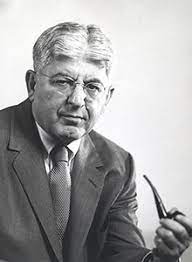
To listen to today’s reflection as a podcast, click here
Throughout the second half of the 20th century, Arthur Burns was a familiar face in the nation’s capital.
He served as an economic counselor to four presidents – Eisenhower, Nixon, Ford, and Reagan – and rose to become Chairman of the Federal Reserve. Along the way he also served as ambassador to West Germany – a crucial role during a time in which America was working to re-establish its relationship with a sworn World War II enemy.
As Os Guinness notes in his book The Call, Burns’ opinions carried weight. With his wavy hair, calm demeanor, and ever-present pipe, when Arthur spoke, people listened.
It just never occurred to most people that they would hear what he had to say at a prayer meeting.
Arthur Burns was Jewish. When he began to attend an informal White House prayer gathering, “no one knew quite how to involve him in the group.”
His presence generated a respectful awkwardness. When it was time to ask someone to lead the group in prayer, he was inevitably passed over in silence.
Then came the day that the group was led by someone who knew neither Burns’ back story nor the group’s reticence. “Arthur, would you be willing to close us in prayer?” The regular attenders stole glances at each other. How was this going to turn out?
Without hesitation, Burns leaned forward, joined hands with the rest of the group, and offered these words:
“Lord, I pray that you would bring Jews to know Jesus Christ. Lord, I pray that you would bring Muslims to know Jesus Christ. Finally, Lord, I pray that you would bring Christians to know Jesus Christ.
Amen.”
That brief prayer has become legendary in Washington, D.C.
It shines a spotlight on a point that must never be neglected: People who endeavor to follow Jesus are always on the road, always on the way, and will never be able to say in this world, “Well, I’ve finally arrived.” There is always more of Jesus to know than any of us can possibly fathom.
Guinness challenges his readers to ponder three words: Christ, Christian, Christianity.
If we conjure up all the associations we have with those three words, do we see some kind of progression? Do we find ourselves going from the personal to the institutional, and from a vision of purity to something that feels like disillusionment – even corruption?
When Christians are at their best, they are hands down the greatest advertisement for the Jesus-pursuing life. But when we are at our worst – smug, judgmental, and hypocritical – the watching world turns away. As the T-shirt puts it, “Jesus, save us from your followers.”
In a pluralistic culture, John 14:6 has become one of the most reviled verses in the Bible. Jesus says, “I am the Way, the Truth, and the Life. No one comes to Father except through me.”
Theologians call this “Christoexclusivity” – a biblical affirmation that is firmly grounded on more than just one verse. Those outside the faith find the notion of the “onlyness” of Jesus to be offensive. Who exactly do we think we are?
When we look at the cross, we see two beams. The vertical beam expresses our conviction that there is only one God, and that Jesus is his one-and-only Son. The vertical beam is tall. And it’s planted deep. Orthodox Christian preaching refuses to budge on that proposition.
But there’s also a horizontal beam – the one that expresses Jesus’ open arms, literally and figuratively. According to story after story in the four Gospels, his invitation to new life included not just the spiritually hungry, but the young, the old, the stranger, the sick, the desperate, the rejected, the spiritually wounded, the hopeless.
It’s just possible that what really rankles outsiders is that they believe the only way they can take John 14:6 seriously is by plunging themselves into that vexing, confusing, exasperating stewpot of preaching and teaching and stumbling called Christianity.
But that’s not what the Bible says. We’re not saved by Christianity – by what the religion-in-Jesus’-name happens to be or what it doesn’t happen to be at any given moment.
We’re saved by Jesus. He is the Way, the Truth, and the Life. And his invitation is directed to the whole world.
As it turns out, Arthur Burns’ prayer echoes Jesus’ chapter-length prayer at the Last Supper as recorded in the gospel of John.
“Now this is eternal life: that they know you, the only true God, and Jesus Christ, whom you have sent” (John 17:3).
Real, lasting life comes down to knowing the Lord and knowing his Son.
As Arthur might put it, “Lord, we pray that you would bring all of us to know Jesus Christ.”
